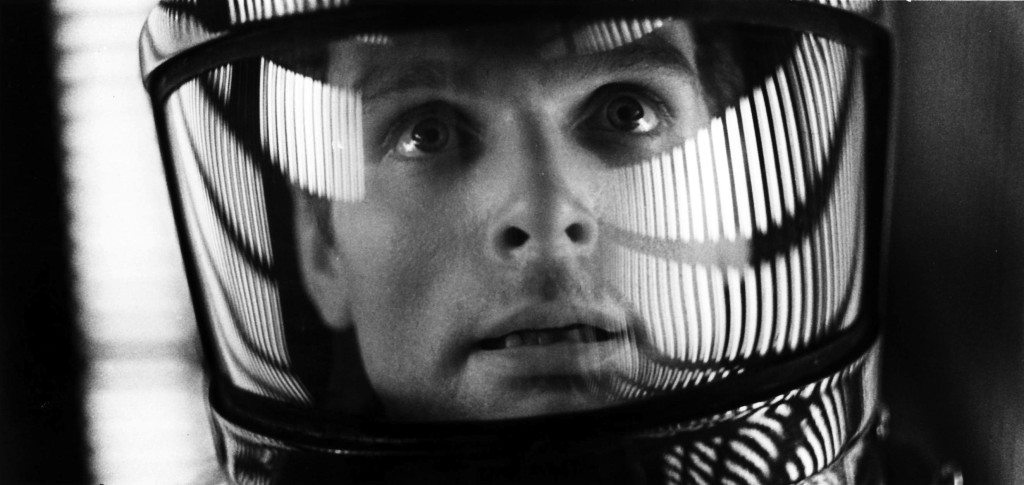2001: A Space Odyssey Re-released
2001: A Space Odyssey is widely considered the greatest science-fiction film ever made, but despite this my overwhelming feeling before watching was not a sense of excitement but of apprehension. Before the curtain drew (literally, it was a classy cinema) I had one prevailing thought. What if I don’t like the film? Can anyone give 2001 a bad review without angering the film gods? Would it just result in another decade of transformers movies? Luckily my hesitations were dispelled almost immediately, as from the moment Richard Strauss’ Also Sprach Zarathustra begins to play to the final beyond the infinite scene the film bombards the audience with spectacular visuals, an incredible score and mystery upon mystery. This provides a film that is as equally visceral as it is challenging and can only be described as true cinema.
After starting with a dawn of man sequence, in which there is no dialogue, the story progresses to Dr. Heywood R. Floyd (William Sylvester) aboard a space plane on route to Clavius base to discuss a secret lunar mission to investigate TMA-1, an artefact deliberately buried four million years ago. Once the TMA-1 mission has concluded we jump forward eighteen months to a new Jupiter mission fronted by Dr. David Bowman (Keir Dullea) and Dr. Frank Poole (Gary Lockwood). Controlling the entire ships operations is the chilling HAL 9000 (voiced by Douglas Rain), a computer system which appears to be able to mirror human emotions and self-proclaims itself as “incapable of error”. Finally, we see Dr. David Bowman’s explorations beyond the infinite, involving the best visual effects sequence of the film, but also the more unusual events of the film take place here. Tying these four acts together are the enigmatic black monoliths, entities which are never explained and have no significant characteristics other than they emit a high pitched frequency, which re-appear at all crucial turning points in the films narrative structure.
2001 doesn’t hold your hand and walk you through the film whilst spoon-feeding you every answer to every question, but instead presents itself in its entirety
It is the black monoliths that have kept the audience guessing for decades. While some point to the monoliths as a minimalistic interpretation of extra-terrestrial life, others believe they represent humanities own ignorance; the absence of light symbolising the incomprehensible. However, the beauty of the monoliths isn’t found within an individual’s interpretation, but in the fact that we are can interpret them at all. 2001 doesn’t hold your hand and walk you through the film whilst spoon-feeding you every answer to every question, but instead presents itself in its entirety and then just exists (much like the monoliths) in each person’s own perspective.
Consequentially, some people’s perspective will be that the film is dull. Numerous amounts of people walked out when 2001 was initially released including Rock Hudson who reportedly proclaimed “Will someone tell me what the hell this is about?” At times the aesthetic qualities are over-indulged, and they do take precedent over the plot, which is loose at best. The characters are cold, arguably the most expressive being the HAL 9000, who shows fear and angst. Ultimately though, the aim of 2001 isn’t to make you fall in love with the characters or be hooked by the narrative rigour, but to pose questions, engage film-goers and leave people feeling mesmerised even when they head back to work the next day.
Ray Bradbury defined sci-fi as “any idea that occurs in the head and doesn’t exist yet, but soon will, and will change everything for everybody” and perhaps the greatest compliment that can be paid to 2001 is just how easy it is to forget that it was released in 1968, before humans had actually stepped foot on to the moon. Whether it’s devices not unlike modern day tablets, or video calls resembling skype, director and co-writer Stanley Kubrick has made a bold prediction of the future with remarkable accuracy. For this reason alone 2001: A Space Odyssey is quintessentially science-fiction, and combining this with the influence it has had on every science-fiction film released since, not to mention the sense of wonder most viewer’s experience, it has rightfully cemented its place as the pinnacle of the genre.
Recently re-realsed by the BFI, 2001: A Space Odyssey will be playing a venues all across the country until March 9, 2015 including Birmingham and Stratford. See the BFI website for more details.
Feature Image, Image 1 (modified)


Comments